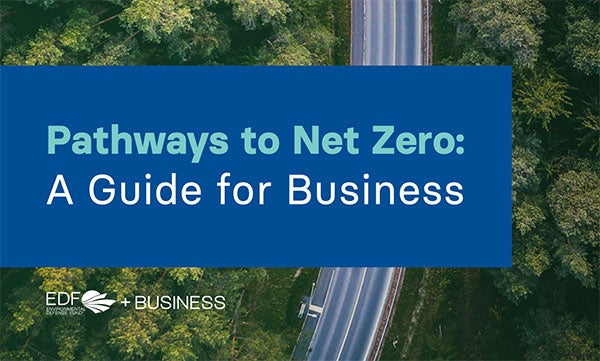2020: The year of net zero talk. 2021: The year of action
In the earliest weeks of the pandemic, I, like millions of others, struggled with feelings of dread, powerlessness, and anxiety. I’ve been working in the corporate sustainability space for nearly 25 years, and during that fateful week of March 9th, 2020 (when the world as we know it forever changed), I couldn’t help but worry about the possibility of decades of climate progress slipping away.
Businesses were, rightfully so, focused on ensuring the health and safety of their workers, and on pivoting supply chains to help create personal protective equipment, ventilators, and sanitizers to help fight the global pandemic.
And yet, as I look back today at the last nine months, I’m happy to report that I’m feeling a lot more optimistic.
Despite all odds, 2020 has been a milestone year for corporate climate leadership, and it has positioned the private sector to raise the bar even further in 2021 – especially when it comes to turning commitments into action and results.
Here’s why.
Businesses accept the reality – and the risks – of climate change
As global temperatures rise, so does the risk of drought, floods, extreme heat, and poverty. In 2017 alone the US experienced multiple climate disasters which had a cumulative cost of over $300B. In addition, more than 200 of the largest global businesses estimate climate change impacts will cost ~$1T by as early as 2024.

But companies are stepping up as never before. The number of net zero commitments has doubled in less than a year, as net zero has become an environmental and a business imperative. Businesses like Facebook, Unilever, Apple, Ford and BP all announced ambitious new climate goals this year.
Companies are realizing the business benefits of acting boldly and acting fast – new products and innovation, reduced supply chain risk, positive engagement with employees, customer acquisition, satisfying demands from investors, and often, cost savings.
Pressure on companies is at an all-time high
When I got started in the corporate sustainability field in the 1990s, the main lever to influence a company’s behavior was regulation. EDF pioneered partnering directly with influential companies to use their purchasing power to drive change through their supply chains and industries. That’s what drove our work with FedEx and Walmart.
Today, additional stakeholders are flexing their muscles and influencing corporate sustainability behavior: employees, customers, and investors. Customers, especially the next generation of consumers, are demanding companies be environmentally and socially responsible. Employees are activating to drive up ambition in companies through platforms like ClimateVoice and coworker.org. And investors are asking for business to lead – even the finance sector is stepping up, such as Morgan Stanley’s net zero commitment for its financing.
Pre-competitive collaboration is the new normal
Companies see the impacts of climate change on their business, their supply chain, and their customers. They are committing to act and are realizing the need to move with urgency together to solve the challenge of climate change.
A great example is the nine companies – Danone, Maersk, Mercedes Benz, Microsoft, Natura and Co, Nike, Starbucks, Unilever and Wipro – who together with EDF launched the Transform to Net Zero coalition to help other companies on the journey to net zero. The goal of these global sustainability leaders is to turn commitments into actionable plans.
Roadmaps will guide companies towards net zero
Even leading companies like the members of Transform to Net Zero don’t know exactly how to get all the way to net zero. But that can no longer be an excuse for inaction today. Studies like the one just released by Princeton show that reaching net zero for the United States is both doable and affordable – but there are huge economic changes that are required and action needs to begin now.
Despite the encouraging trend of companies committing to net zero by 2050, setting goals is not enough to bend the curve on climate pollution. Net zero targets must be followed by detailed transition plans including near-term milestones for deep emissions reductions, investments in innovation and new business models, and public policy advocacy.
A new report produced by EDF with research and analytical support from Deloitte, LLC, gives business leaders the clarification needed to accelerate the transition to a sustainable and just future. Pathways to Net Zero: A Guide for Business provides sector-specific pathways covering agriculture and transportation to reach 2050 targets and examines how the influential industries of technology and retail can scale progress.
The analysis includes a roadmap with action items that companies, industries and sub-sectors can take today relative to their own operations, investments, and supply chains to drive the most meaningful impact toward net zero by 2050. It also emphasizes the critical need for coordination and advocacy to bring everyone along on the path to net zero.
Some issues need urgent attention: In particular, we must actively reduce short-lived climate pollutants, such as methane, in addition to reducing carbon dioxide, because 50% of warming over next two decades (from today’s emissions) will be due to methane. In addition, we must do all we can to protect current carbon stocks. That means priority number one is to stop tropical forests from being cut down. With stopping deforestation, we will have a dramatically worse climate change problem.
For companies, the time to act is now. Set an ambitious goal and timeline and get going on the path to net zero.
If 2020 had taught us anything, it’s that big challenges can only be met when the public and private sector work together. That’s what’s required to build a more sustainable, equitable and resilient future.
